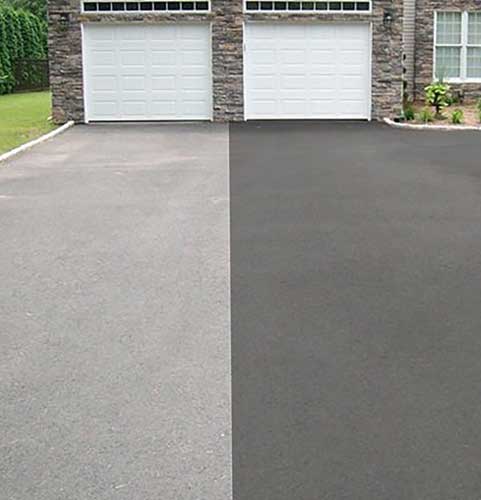Enhance Durability with Cold Mix Asphalt: Specialist Sealing Solutions
Enhance Durability with Cold Mix Asphalt: Specialist Sealing Solutions
Blog Article
Cold Mix Asphalt Vs. Hot Mix Asphalt: Which Is Right for You?

Structure Distinctions
Cold mix and hot mix asphalts differ significantly in their composition, with distinct features that affect their efficiency and applications. Cold mix asphalt is created by emulsifying the asphalt binder with water and an emulsifying agent before blending it with accumulation. This method enables the asphalt to be convenient at lower temperature levels, making it suitable for momentary repair services and for usage in colder climate condition. Warm mix asphalt, on the other hand, is produced at high temperature levels, usually between 300-350 ° F, which assists to achieve much better compaction and a more sturdy last item. The hot mix asphalt manufacturing procedure entails warming the accumulation and asphalt binder individually prior to incorporating them at the asphalt plant.
Furthermore, cold mix asphalt tends to be much less thick and extra adaptable than warm mix asphalt. This flexibility makes it far better fit for areas with higher degrees of activity, such as driveways or roadways with hefty website traffic. On the other hand, hot mix asphalt is known for its high resilience and resistance to rutting and fracturing, making it a preferred choice for highways and high-traffic roads where durability is important.
Installment Process Differences
The procedure of installing chilly mix and warm mix asphalt exhibits noteworthy differences in their procedures and needs. Cold mix asphalt, being an extra adaptable product, can be applied straight from the bag or container onto the pit or damaged area. It calls for minimal preparation job, such as cleansing the location and compacting the cool blend with hand tools. This makes it a convenient alternative for quick and short-lived solutions. In contrast, hot mix asphalt demands a more intricate installment process. It entails heating the mix to high temperatures prior to laying it down on a properly ready base. The prep work consists of condensing the base, using a tack coat, and using hefty machinery like pavers and compactors for a resilient and smooth coating. As a result of the heating demands, warm mix asphalt setups are usually performed by professionals with specialized tools, making sure a much more structurally sound and long-term outcome.
Durability and Durability Elements
When considering asphalt choices, sturdiness and durability are see this important variables to review for lasting pavement efficiency. Warm mix asphalt (HMA) is understood for its outstanding longevity and long life.
In terms of longevity, HMA normally exceeds CMA due to its remarkable toughness and resistance residential properties. HMA pavements have a longer solution life, requiring less constant fixings and upkeep, which can translate to cost savings over time. In addition, HMA sidewalks are much more conveniently customizable to meet particular project needs, additionally boosting their longevity.
Cost Factors To Consider
Taking into consideration the economic effects is an important element when evaluating the selection between warm mix asphalt (HMA) and cool mix asphalt (CMA) for sidewalk tasks. While the preliminary cost of warm mix asphalt is commonly greater than that of cold mix asphalt, HMA usually offers a much more economical option in the long run due to its premium durability and longevity.
In enhancement to material prices, it's necessary to consider the costs connected with installment and upkeep when comparing HMA and CMA. HMA normally needs specialized tools and experienced labor for appropriate setup, which can impact total task prices. On the other hand, CMA is less complicated to collaborate with and can often be used using simpler strategies, possibly decreasing installation expenditures. Inevitably, the decision between HMA and CMA should consider not simply the first cost yet also the long-term financial effects to establish one of the most cost-effective option for discover this the certain pavement task.
Environmental Influence Comparison
Comparison of the environmental effects between warm mix asphalt (HMA) and cold mix asphalt (CMA) reveals distinct distinctions in sustainability methods. HMA manufacturing requires high temperatures, leading to boosted power intake and greenhouse gas discharges. The process likewise releases unstable natural substances (VOCs) and harmful air toxins (HAPs) into the atmosphere. In comparison, CMA is generated and used at lower temperatures, lowering power usage and exhausts significantly. The reduced production temperatures of CMA lead to decreased gas intake and reduced degrees of CO2 exhausts, making it a much more eco friendly option.
Additionally, the use his response of CMA often entails recycling existing asphalt sidewalk, promoting resource conservation and decreasing the amount of waste sent to landfills. By opting for CMA over HMA, road building tasks can add positively to ecological preservation efforts.
Verdict
To conclude, the choice in between cold mix asphalt (CMA) and hot mix asphalt (HMA) depends on various variables such as composition, installment process, resilience, long life, cost, and environmental impact. asphalt repair. While CMA provides a fast and cost-efficient solution for small repairs, HMA guarantees remarkable resilience and longevity for hefty website traffic areas. Think about these variables meticulously to identify which kind of asphalt is the right option for your paving requires

Thinking about the monetary implications is a crucial element when evaluating the selection between hot mix asphalt (HMA) and cold mix asphalt (CMA) for pavement jobs. While the initial cost of hot mix asphalt is usually higher than that of cold mix asphalt, HMA often offers a much more economical solution in the lengthy run due to its superior longevity and longevity. cold mix asphalt.Comparison of the ecological effects in between warm mix asphalt (HMA) and cold mix asphalt (CMA) exposes distinctive differences in sustainability methods.In conclusion, the selection in between chilly mix asphalt (CMA) and warm mix asphalt (HMA) depends on various elements such as make-up, setup process, longevity, durability, cost, and ecological influence
Report this page